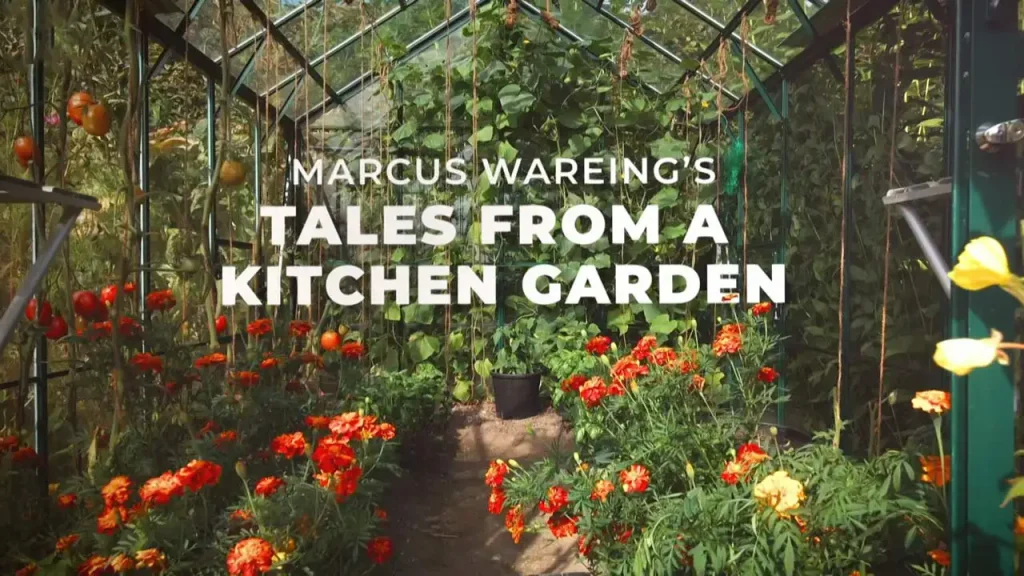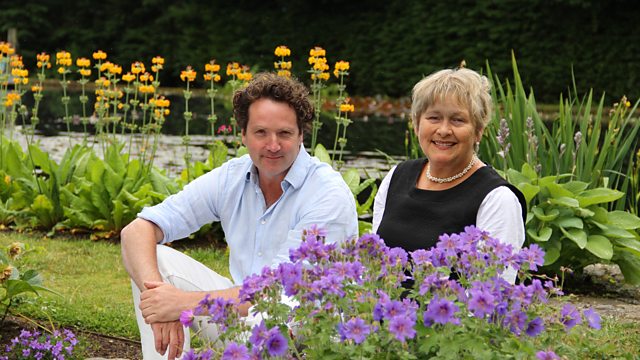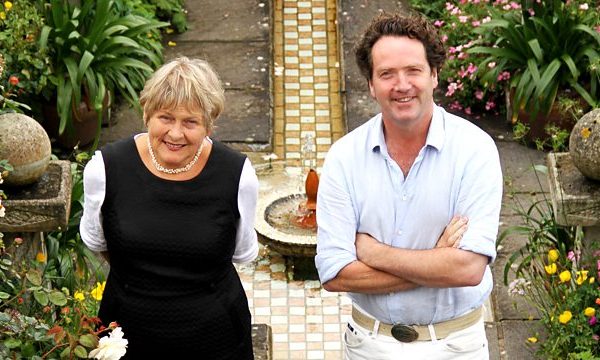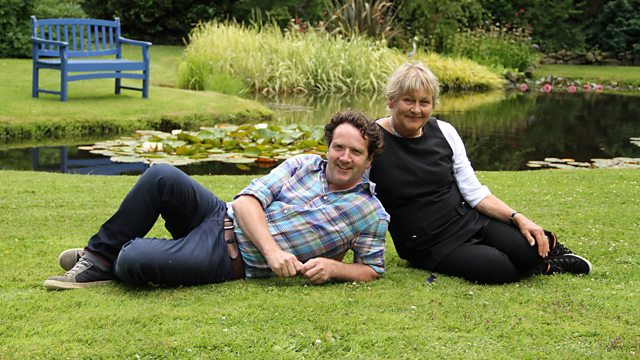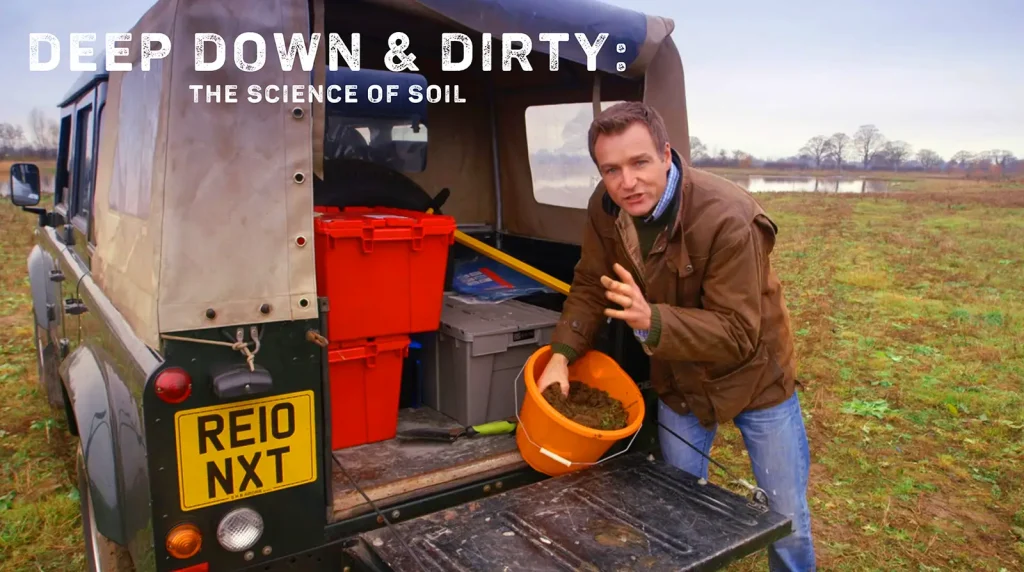Marcus Wareing’s Tales from a Kitchen Garden 2023 Episode 17 – In the heart of the orchard, a myriad of fruits hang heavily on the branches, their vibrant colors and lush ripeness almost begging to be picked. Yet, as the seasons progress, countless apples fall and litter the ground, their potential lost and leading to a saddening wastage. Determined to transform this surplus into something valuable, Marcus sets his sights on crafting his very own cider. In pursuit of mastery over this ancient beverage, Marcus embarks on a journey to ‘The Newt in Somerset’. Here, he meets Greg, a seasoned cider maker whose expertise is evident in the amber nectar he produces. Greg welcomes Marcus with open arms, guiding him through their vast orchard, which stands as a testament to generations of careful cultivation. The tour culminates in a hands-on cider-making session, where Marcus delves into the nuances of selecting, pressing, and fermenting the finest apples.
Back at the sanctuary of his farm, more tasks await Marcus. The robust aroma of ginger fills the air as he sets about preserving the rhizomes to capture their spicy essence. Additionally, the mischievous Mangalitsa pigs are up to their usual antics. With gentle persuasion, Marcus relocates them to a fresh, sprawling home amid the verdant woods. Seeking further knowledge, Marcus ventures out once again. This time, his guides are the innovative forest gardeners who unravel the secrets of cultivating a dense, edible forest even within the constraints of limited space. They showcase how every inch of soil can bear bountiful produce with the right care and planning.
Later, as the sun casts dappled light through the trees, Marcus retreats to a cozy nook in the woods. There, with the comforting crackle of his fire pit for company, he crafts a deceptively simple meal. Sausages sizzle and potatoes turn golden, their flavors elevated to gourmet heights when cooked over open coals. The pièce de résistance? A rich, aromatic gravy that transforms the humble fare into a feast fit for a king.
Marcus Wareing’s Tales from a Kitchen Garden 2023 Episode 17
In the heart of the orchard, a myriad of fruits hang heavily on the branches, their vibrant colors and lush ripeness almost begging to be picked. Yet, as the seasons progress, countless apples fall and litter the ground, their potential lost and leading to a saddening wastage. Determined to transform this surplus into something valuable, Marcus sets his sights on crafting his very own cider.
In pursuit of mastery over this ancient beverage, Marcus embarks on a journey to ‘The Newt in Somerset’. Here, he meets Greg, a seasoned cider maker whose expertise is evident in the amber nectar he produces. Greg welcomes Marcus with open arms, guiding him through their vast orchard, which stands as a testament to generations of careful cultivation. The tour culminates in a hands-on cider-making session, where Marcus delves into the nuances of selecting, pressing, and fermenting the finest apples.
Learning the Art of Cider Making at The Newt in Somerset
Nestled amongst the rolling hills of Somerset lies The Newt, a verdant estate renowned for its impressive gardens and historic cider mill. Owned by enthusiastic entrepreneurs Karen and Dick Roe, The Newt has been lovingly restored, with its cider pressing traditions revived.
Marcus arrives eager to glean cider wisdom from Greg, The Newt’s talented cider maker. Greg’s passion lies in using traditional techniques to create complex, nuanced ciders that reflect the terroir of the estate’s orchards. As they meander through rows of apple trees, Greg points out the differences between bittersweet and sharp varieties, crucial for blending balanced ciders. He emphasizes the importance of picking apples at their peak ripeness, where higher sugar and tannin levels lead to better fermentation and a richer final product.
Finally, they reach the cider house, replete with timeworn oak presses. Greg demonstrates the process, starting with milling and mashing the apples into pomace. This pulp is then layered onto cloths and stacked onto the press, where gradual turning tightens and compresses it. Marcus lends a hand, feeling the pomace’s gritty texture and inhaling its fruity aroma. As juice trickles out, Greg explains how fermenting with native yeasts retains each vintage’s unique characteristics. After sampling the refreshing juice, Marcus gains newfound respect for the craft and patience involved in cider making.
Preserving the Pungent Essence of Ginger
Back home, Marcus turns his attention to preserving one of his garden’s most vibrant ingredients – ginger. Though fresh ginger packs a punch, drying and pickling help lock in its spicy essence for longer enjoyment.
Before getting started, Marcus dons gloves and digs up plump ginger rhizomes, selecting younger specimens with smooth, taut skin. After a good wash, he peels and slices them into coins, admiring their fibrous flesh and distinctive aroma. Smaller nubbins are left whole.
For drying, Marcus arranges ginger slices on wire racks and places them in a warm oven. Over several hours, the slices shrink and shrivel as moisture evaporates, intensifying their spicy oils. He samples a slice – the chewy, concentrated ginger makes his tastebuds tingle! Marcus stores the dried ginger in jars for future use.
Pickling requires salting the ginger first to remove excess water. Marcus massages salt into the nubbins and lets them sit overnight. After rinsing off the salt, he packs the nubbins into sterilized jars and covers them with a hot vinegar solution infused with warm spices – cinnamon, star anise, and peppercorns. Once sealed, these piquant pickles will keep for months.
Between drying and pickling, Marcus has successfully stockpiled ginger’s unique bite. He looks forward to using them in both sweet and savory dishes this winter.
Providing a New Home for Mischievous Mangalitsa Pigs
Also roaming Marcus’ farm are a trio of Mangalitsa pigs, whose shaggy coats and spirited antics always make him smile. However, their penchant for escaping and rooting up vegetables has become a nuisance. Marcus decides it’s time to move them to fresh foraging grounds.
Native to Hungary, Mangalitsas are a heritage breed prized for their flavorful meat. Marcus chose them for their hardiness and friendly nature, though their intelligence means they’re often troublemakers! Their new home will be a forested section with plenty of space to roam.
After baiting a trailer with beloved treats, Marcus gently herds in the three pigs for transport. They snuffle curiously at their new surroundings. Upon arrival, the Mangalitsas eagerly leap out and begin exploring. Marcus guides them to a paddock sectioned off for rotational grazing, with a cozy barn for shelter.
He smiles as the pigs enthusiastically root through leaf litter and soil, aerating the ground and feasting on grubs and fungi. This more stimulating environment will engage their foraging instincts. By rotating paddocks and supplementing with garden surplus, Marcus can raise the pigs sustainably while protecting his crops.
At day’s end when he calls out to them, the Mangalitsas come bounding back, ready for a goodnight scratch behind the ears. Their contented snuffles assure Marcus his mischievous mates are going to thrive in their new home.
Uncovering the Secrets of Successful Forest Gardening
Seeking more knowledge, Marcus arranges to visit a unique operation – a highly productive forest garden. Run by expert growers Mark and Emma, this cultivated woodland provides inspiration for Marcus’ own small-scale sustainable growing.
Mark and Emma explain that unlike monotonous rows of single crops, a forest garden comprises multiple usable layers – from canopy trees to shrubs, herbs, vines and fungi. By mimicking woodland ecosystems, combinations of plants form beneficial relationships, reducing the need for inputs.
Walking through the garden, Marcus is struck by the diversity. Tall fruit trees like apples filter sunlight for berries and currants below. Nitrogen-fixing trees fertilize demanding plants such as fruiting brambles. Dynamic accumulators like comfrey mine nutrients from deep soils, recycling them via leaf litter. Marcus gains insight into soil health as the foundation of productive gardens.
Mark and Emma also stress resilience. The garden provides year-round harvests, with different species peaking in yield at varied times. This lessens failure risk if one crop underperforms. A focus on perennials reduces planting efforts too, while beneficial insect habitats keep pests in check naturally. Marcus leaves with new appreciation for maximizing productivity sustainably, even on a small scale.
Finding Joy in Simple Wood-Smoked Comfort Foods
As evening casts its glow, Marcus reflects on the day’s adventures by cooking up a simple but satisfying wood-smoked supper. Choosing fresh ingredients from the farm and smoking them over an outdoor pit infuses them with inimitable flavor.
Marcus gets a small fire crackling, then nestles potatoes into the embers. Smoking slowly over low heat ensures they become impossibly creamy inside while developing a smoky, charred jacket. The potatoes turn a perfect golden brown, ready for crushing and mixing with butter and warm milk.
Next, Marcus grills up some pork and leek sausages, made using heritage breed meat. He turns them gently, patiently building up that lovely smoked essence. After nicking their skins, the sausages become succulent and juicy, releasing a porky, herbal aroma.
For a final touch, Marcus makes a rich onion gravy. Sweating down halved onions with garlic and thyme creates a flavorful base. Sprinkling on flour then whisking in wine, stock and cream yields a smooth, deeply savory gravy. Spooned over the sausages and potatoes, it elevates the humble dish into a mouthwatering feast.
Relaxing by the fire with his plate, Marcus feels gratitude for the day’s experiences. Simple homegrown food, prepared with care and enjoyed with mindfulness, remains life’s greatest pleasure.
In Closing
This episode illuminated valuable lessons about living sustainably from the earth’s bounty. Marcus gained broader knowledge about heritage practices like cider making, learning first-hand how experience and patience create superior end results. Preserving techniques also allow us to enjoy seasonal produce year-round. Most importantly, Marcus was reminded how nurturing the land and respecting natural ecosystems yield generous rewards.
Though ambitious projects like forest gardening require space and time, we can still implement their principles at home. At day’s end, taking joy in preparing and sharing wholesome, ethical meals may be the simplest route to lasting fulfillment. Much like a thriving garden, the cultivation of wisdom and fulfillment is a gradual, lifelong process.
Frequently Asked Questions
What are some key lessons Marcus learned from his experiences?
Some key lessons include the importance of patience and care to create quality products, utilizing traditional and sustainable techniques like forest gardening, preserving seasonal abundance to enjoy year-round, respecting natural ecosystems and animal welfare, and finding joy in mindful cooking and eating.
What ingredients and dishes did Marcus work with?
Marcus used apples for cider making, ginger for drying and pickling, Mangalitsa pigs for ethical meat, potatoes and sausages for wood-smoked dishes, and onions for gravy. This highlighted how diverse ingredients can be preserved, grown sustainably, and prepared simply but deliciously.
What is forest gardening and what are its benefits?
Forest gardening mimics woodland ecosystems with edible trees, shrubs, herbs and fungi grown together symbiotically in layers. Benefits include reduced inputs, year-round harvests, natural pest control and efficient land use. Principles can be applied in small spaces.
Why did Marcus relocate his Mangalitsa pigs?
The pigs were escaping their pen and damaging crops. Their new forested home provided more space to roam, forage naturally and exhibit natural behaviors, improving their welfare while also protecting the farm’s vegetables.
How does smoking help elevate the flavor of simple foods like potatoes and sausages?
Smoking over wood infuses foods with distinctive smoky notes and deepens flavors slowly through gentle heating. Smoked potatoes become extra creamy and rich. Smoking sausages enhances their spice and aroma. Overall smoking enhances umami and sophistication.
